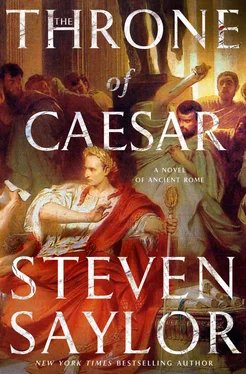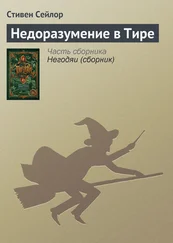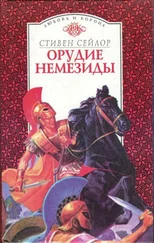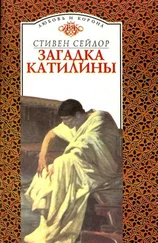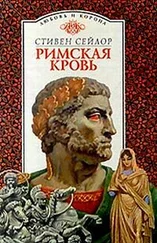Стивен Сейлор - The Throne of Caesar
Здесь есть возможность читать онлайн «Стивен Сейлор - The Throne of Caesar» весь текст электронной книги совершенно бесплатно (целиком полную версию без сокращений). В некоторых случаях можно слушать аудио, скачать через торрент в формате fb2 и присутствует краткое содержание. Год выпуска: 2018, Издательство: St. Martin's Press, Жанр: Исторический детектив, на английском языке. Описание произведения, (предисловие) а так же отзывы посетителей доступны на портале библиотеки ЛибКат.
- Название:The Throne of Caesar
- Автор:
- Издательство:St. Martin's Press
- Жанр:
- Год:2018
- ISBN:нет данных
- Рейтинг книги:5 / 5. Голосов: 1
-
Избранное:Добавить в избранное
- Отзывы:
-
Ваша оценка:
- 100
- 1
- 2
- 3
- 4
- 5
The Throne of Caesar: краткое содержание, описание и аннотация
Предлагаем к чтению аннотацию, описание, краткое содержание или предисловие (зависит от того, что написал сам автор книги «The Throne of Caesar»). Если вы не нашли необходимую информацию о книге — напишите в комментариях, мы постараемся отыскать её.
The Throne of Caesar — читать онлайн бесплатно полную книгу (весь текст) целиком
Ниже представлен текст книги, разбитый по страницам. Система сохранения места последней прочитанной страницы, позволяет с удобством читать онлайн бесплатно книгу «The Throne of Caesar», без необходимости каждый раз заново искать на чём Вы остановились. Поставьте закладку, и сможете в любой момент перейти на страницу, на которой закончили чтение.
Интервал:
Закладка:
“I hardly need an appointment to call on my dearest drinking companion in the world, other than you.”
“You and Antony?”
“Oh, yes. Before I took up with the likes of you and the other lowlifes in this establishment, I had the pleasure on countless nights of drinking till dawn with dear old Antony, reciting poetry back and forth, and challenging the other guests to outdrink us—which they never did. That was back in the good old days before he married Fulvia, when he was living with that lovely actress, the divine Cytheris.”
“But you’re drinking companions no longer?”
“No. Antony is a reformed man, forever striving to please our Dictator on the one hand and his wife on the other. Oh, and also to please our fickle citizenry, who for some reason frown on having a drunkard for consul. The two of us are still great friends, and always will be, I hope. But—I shall put it bluntly—Antony is no fun anymore. No fun at all. So drink up now, before we go, because we’re not likely to be served a drop of wine at the consul’s house!”
XVI
Antony’s house was located on the southwestern slope of the Esquiline Hill. To reach it, Cinna, Davus, and I traversed the entire length of the Forum, walking past gleaming temples and across grand ceremonial spaces. For a while, following Caesar’s victory, the Forum had become a strangely quiet, dreary place, depopulated by the deaths of so many among Rome’s ruling class. Now the Forum was bustling again, as senators and magistrates and priests and bankers crisscrossed the open spaces and gathered to talk on temple steps, attended by little armies of scribes and clerks and citizens seeking favors from them. Some of these senators looked rather foreign, sporting braided hair and long mustaches, and they sounded foreign, too, chattering among themselves in their Gaulish dialects.
Having crossed the Forum, we ascended the Esquiline and at last arrived at the House of the Beaks, so-called because the vast dwelling had once been owned by Pompey the Great, who had decorated the huge vestibule with metal ramming beaks from ships captured during his illustrious campaign to rid the sea of piracy. After Pompey lost his head in Egypt, there had been a mad scramble by Caesar’s supporters to lay hands on his many houses and estates. Antony claimed the House of the Beaks .
I had visited the house not long after Antony moved in, when he was living there with Cytheris. Though Cytheris thought them hideous, the ramming beaks had remained in place. Only the choicest of these trophies were displayed; it was said that Pompey had captured over eight hundred ships. I presumed that Antony had disposed of them—who would want to keep a dead man’s trophies as decoration to be seen by every visitor?—but to my surprise, the beaks were still there. As the three of us waited for word of our arrival to be conveyed to Antony, we strolled about the huge vestibule, gazing at the beaks. Sometimes one sees ships with crudely fashioned beaks, little more than man-size lumps of bronze with a pointed end, but these were all amazing works of art, fashioned to look like griffins with ferocious beaks or sea monsters with multiple horns.
“Beautiful, aren’t they, Finder?” said Cinna.
“Fearsome, I would say.”
“Beautiful and fearsome,” said a voice I knew at once. I had not seen Fulvia in quite some time—not since her marriage to Antony—but her voice, like everything else about her, was distinctively her own, deeper than that of most women. Mannish, some called it, a word often used to describe Fulvia. The passing years had made her voice even deeper, giving it a pleasant huskiness that played upon the ear like silk upon one’s fingertips.
Fulvia had risen to prominence thanks to marriages to one powerful, ambitious (and doomed) man after another. Her first husband had been the rabble-rouser Clodius, whose control of the mob gave him the run of the city. Eight years ago Clodius had been murdered on the road his ancestor built, the Appian Way. Fulvia had staged his funeral as a grand political event that turned into a riot and climaxed with the burning of the Senate House. Her second husband, Curio, had been one of Caesar’s most promising lieutenants, but Curio died early in the civil war, killed by King Juba of Numidia, who desecrated his corpse and took his head for a trophy. After that humiliation, Fulvia had vanished from public view, reappearing in a seat of honor to view Caesar’s African triumph, in which the late King Juba’s infant son had been paraded as a victor’s trophy. Her second widowhood ended with her marriage to Antony. He was arguably the most promising of her husbands, though it was hard to say how much any man’s ambition mattered now that a dictator ruled Rome.
“That one is Antony’s favorite.” She pointed to one of the beaks, a spike that looked like a giant conical seashell. I looked at Fulvia instead. My association with her went back many years. When I had last seen her, she was still dressed in mourning for Curio; her black mantle had framed a beautiful but brooding face lined with bitterness. Now she had to be in her forties but actually looked younger than before. Strife and strain had been erased from her face, replaced by an expression that was at once happily optimistic and grimly determined. She was dressed in a sleeveless gown suitable for home wear, immodestly showing her shoulders and arms.
“I know that you, Gaius, have a rather soft spot for this one.” Fulvia touched a beak cast in the form of a young sea nymph with a smiling face, seaweed for hair, and small, bare breasts.
Cinna smiled. “It’s the irony that strikes me. Imagine a crew of sailors being sent to the bottom of the sea after being rammed by such a pretty thing.” He touched the cold metal, allowing his fingertips to linger on the girlish breasts.
Fulvia raised an eyebrow. “Greetings, Gaius, and welcome.” She offered her cheek, to which Cinna pressed his lips. But the kiss never happened. Fulvia drew back very slightly just as Cinna’s lips might have touched her.
“And welcome to you, also, Finder. And to your son-in-law.” No cheek was offered to me or Davus.
“I presume the three of you have come to see Antony, not me. You’re in luck. He hasn’t yet gone out for the afternoon. There’s so much pressing business for a consul, every hour of every day. It never stops.”
“Keeps Antony out of trouble,” said Cinna.
“Most of the time,” said Fulvia. “I keep him out of trouble the rest of the time. Follow me. I think he’s in the garden.”
As we were led through various rooms and hallways, I remembered the last time I had been in the house, and how stripped of furniture and ornaments it had been. Hundreds of items accumulated by Pompey were being put up for auction by Antony, with the proceeds supposedly going to the public treasury. Some said that Antony, and others allied to Caesar, were simply enriching themselves, seizing properties and taking much if not all of the proceeds for their own use. There had been some friction between the Dictator and Antony over the matter, but apparently the rift had been healed, since Caesar had seen fit to make Antony consul. And the house no longer looked empty. The many corners and walls and niches had been redecorated with furniture and paintings and statues, presumably brought in by Antony’s new wife. One of the pieces, a small but striking bronze statue of a satyr cavorting with a goat, I recognized from a visit I had paid to Fulvia after the murder of her first husband.
About the matter of confiscated property, Antony and Caesar had been reconciled. Now they were said to be at odds again, this time over Caesar’s choice of a consul to replace himself and to serve alongside Antony after Caesar left for the Parthian campaign. Caesar intended to hand over the consulship to Dolabella, whom Antony detested. The question was to be decided at the meeting of the Senate on the Ides. It seemed a relatively small matter to me, but not, apparently, to Caesar, who had put Antony’s name on the list he had given me. Perhaps Caesar feared that living in Pompey’s house had given Antony ideas about becoming a second Pompey. More likely, it was Fulvia who might goad his ambition to one day be called Antony the Great. I recalled words once spoken to me in confidence by Calpurnia: “Mark my words, Fulvia has her eye on our Antony, and if those two should ever join forces … beware!” Perhaps Calpurnia’s husband shared her apprehension.
Читать дальшеИнтервал:
Закладка:
Похожие книги на «The Throne of Caesar»
Представляем Вашему вниманию похожие книги на «The Throne of Caesar» списком для выбора. Мы отобрали схожую по названию и смыслу литературу в надежде предоставить читателям больше вариантов отыскать новые, интересные, ещё непрочитанные произведения.
Обсуждение, отзывы о книге «The Throne of Caesar» и просто собственные мнения читателей. Оставьте ваши комментарии, напишите, что Вы думаете о произведении, его смысле или главных героях. Укажите что конкретно понравилось, а что нет, и почему Вы так считаете.
